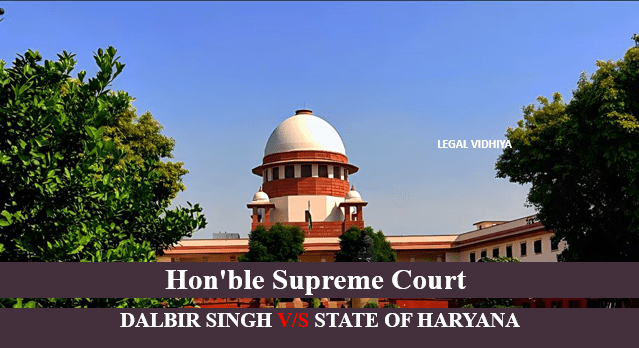
DALBIR SINGH V/S STATE OF HARYANA (2000) 5 SCC 82 193
Citation (2000) 5 SCC 82 193 Date of Judgement 04/05/2000 Court Supreme Court of India Case Type Criminal Appeal no. 426 of 2000 Appellant Dalbir Singh Respondent State of Haryana Bench K.T. Thomas Doraiswamy Raju Referred Section- 279 and 304-A |
FACTS OF THE CASE
In this Case Appellant (Dalbir Singh) was driving the bus of Haryana Roadways. It was on the evening of 04-07-1994 at 6:15pm that the appellant hit the cyclist in front of the main gate of the Board of School Education situated at Bhiwani. The cyclist just left the office of the Board where he was working.
The bus driver after hitting him with the bus, dragged the cyclist for some distance due to which he was crushed to death. The bus driver was held liable under Section 279 and 304- A of Indian Penal Code. According to these sections the driver was sentenced to imprisonment for 3 months and one year.
The appellant made two-fold pleas in front of the trial court. One of them was that he was not the person who was driving the bus. And secondly, was that the accident happened due to the negligence of the cyclist.
Both the pleas filled by the appellant were rejected by Trial Court and the Session Court. On the positive aspect both the corts have found that the incident took place in the town area where the offices are situated so it is the responsibility of the motor vehicle driver the drive with great care and it was the result of the driver’s recklessness that a young man was crushed to death under the wheels of the vehicle.
The revision filled before the High Court by the appellant was dismissed thereafter.
ISSUE BEFORE THE COURT
Whether the person charged under Section 279 and 304-A be invoked with the provision of the Prohibition of Offenders Act, 1958 or PO Act?
ARGUMENT
The defence counsel pleaded for the invocation of the provision of Prohibition of Offenders Act by citing the case of Aitha Chander Rao v/s State of Andhra Pradesh (1981) SCC 17. In this case the bench of two judges which extended the benefit of Section 4 of PO Act to the accused had made it clear that such a course was resorted to ‘having regard to the peculiar circumstance of this case’.
But it was found that none of the peculiar circumstances have been specified except the negligence on the part of the driver. Therefore the said decision cannot be treated to invoke the provision of PO Act where the accused have been sentenced under the section 304-A of Indian Penal Code in causing the death of a person due to reckless driving.
JUDGEMENT
In this case, the judgement was given by THOMAS, J. where it was said that when automobiles had become the death trap for the people and any leniency shown to such drivers can increase the risk of road accidents.
According to the court, it is the duty of the drives of the automobiles who are manning the steering, specially the professional drivers, should keep in their mind regarding taking utmost care while driving the automobile. One of the best way to keep such drivers reminding of their duty is by maintaining punishment in sentencing sphere. Any leniency shown to such drivers would tempt them to drive more carelessly and negligently.
The judgement given by the court is appropriate as if the drivers are not under the mental duty they would become carefree and reckless and would drive the automobile negligently causing threat to the lives of the people.
REFERENCE
Indian Penal Code by K D Gaur
This Article is written by Manvi Verma of The Law School, University Of Jammu and Intern at Legal Vidhiya




0 Comments